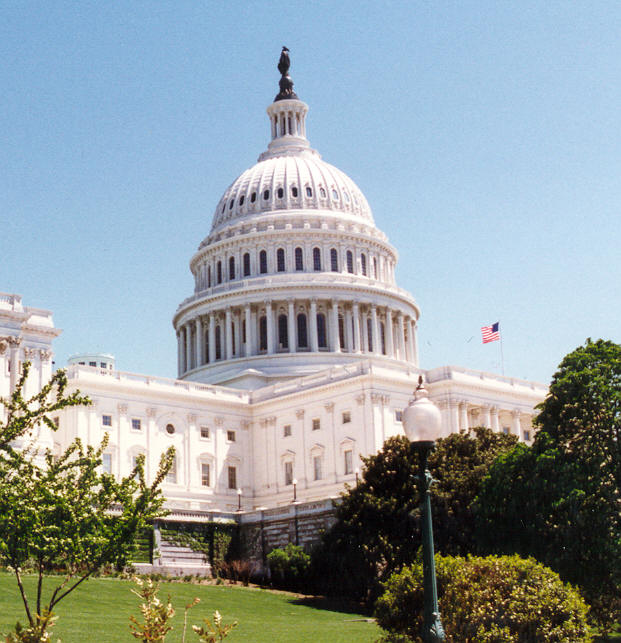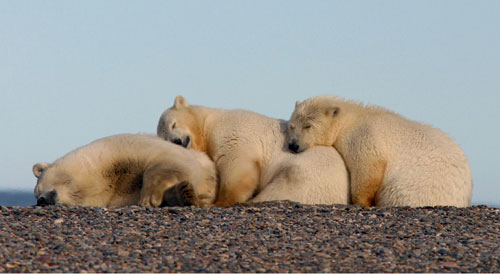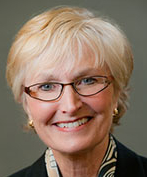|
|
|
|
|
|
|
|
 Today's Congressional Action: Today's Congressional Action:
The House and Senate are not in session.
|
Arctic Scientists Collaborate on Climate Research. The myriad of changes in the Arctic is contributing to a "new state" of northern marine ecosystems, according to more than 100 Arctic scientists and local experts that recently published multiple research papers on several facets of the topic. That is to say, there's no going back. From walrus haulouts, to coastal erosion, to new plant species, and more, the Arctic environment isn't what it was even just a decade ago. The Arctic Sounder
Neurotoxin in Giant Algal Bloom Has Alaska Researchers on Alert. An enormous algal bloom containing domoic acid, a potentially fatal neurotoxin that shut down dungeness crab and razor clam fisheries in Washington state this summer, has spread to Alaska waters. But dozens of shellfish samples taken since the bloom appear to contain only trace amounts of the substance, state scientists said this week. Shellfish that consume the algae appear to be unharmed by domoic acid, but in high enough concentrations the toxin causes a host of health problems in the mammals that eat them. In 1987, at least 107 people who bought contaminated mussels from Prince Edward Island in Canada reported a variety of symptoms including vomiting, headaches, diarrhea and, in many cases, permanent short-term memory loss. Three of them, aged 71 and older, died. Alaska Dispatch News
 How to De-Oil a Polar Bear: Grim Outlook for Wildlife Impacts From an Arctic Spill. In the event of a large oil spill in Alaska's Arctic, officials say they would have limited ability to clean oiled marine mammals, and in some cases might not be able to clean them at all. Assuming rescuers could reach them, polar bears would have to be cleaned just a few at a time. And the prospects for walruses are even grimmer. Alaska Dispatch News How to De-Oil a Polar Bear: Grim Outlook for Wildlife Impacts From an Arctic Spill. In the event of a large oil spill in Alaska's Arctic, officials say they would have limited ability to clean oiled marine mammals, and in some cases might not be able to clean them at all. Assuming rescuers could reach them, polar bears would have to be cleaned just a few at a time. And the prospects for walruses are even grimmer. Alaska Dispatch News
Plans for Warming Arctic Could Tap Massive Wealth. As you may have seen in the headlines in early August, Russia is trying once again to stake a claim to 463,000-square-miles in the Arctic Ocean. While a UN commission rejected a similar petition back in 2002, the Russians now claim to have new scientific evidence that the Eurasian continental shelf extends out far enough from Russia's northern shoreline to give Russia economic control of those waters under international law.
But the Russians have competition. Denmark also has claimed sovereignty over part of the same watery expanse, and Canada wants a big piece of the top of the world as well. Discovery
Extreme Diving, Crucial to Arctic Research. How do algae react to the warming of the Arctic Ocean? How is it affecting wildlife in the fjords? To find answers, researchers rely heavily on divers who brave the icy waters to gather samples. "Without them, we wouldn't be able to successfully complete our projects," admits Cornelia Buchholz, a marine biologist who is working at Ny-Alesund on Spitsbergen, the largest island of the Svalbard archipelago in the heart of the Norwegian Arctic. Until the start of the 1960s, this town -- the northernmost permanent human settlement in the world -- was populated by coal miners. Yahoo! News
|
|
Legislative Action
No Arctic legislation was formally considered yesterday.
|
|
Future Events
The Alaska Arctic: A Summit on Shipping and Ports, August 23-25, 2015 (Anchorage, Alaska, USA). Alice Rogoff will host the summit along with the state of Alaska and various partners, including President Ólafur Ragnar Grímsson of Iceland and Mead Treadwell, president of Pt Capital and former Alaska lieutenant governor. The purpose of the meeting is to build partnerships to develop safe and reliable shipping through the Alaskan Arctic. These partnerships will be necessary to finance needed ports of refuge, search and rescue equipment, transshipment facilities and icebreakers. At the same time, the interests of local and indigenous residents must be an integral part of any development planning.
Joint EDA-ARC Committee Hearing, August 25, 2015 (Anchorage, AK, USA). The Alaska Legislature's House & Senate Arctic Committees will be hosting a hearing session immediately following the Alaska Summit on Arctic Shipping and Ports from 2-4 PM August 25th at the Anchorage LIO, 716 W. 4th Avenue. Select participants will report out on their takeaways and thoughts on the conference, with an emphasis on what the Legislature can do to address the challenges and opportunities in Alaska's maritime Arctic. The hearing can be viewed live at AKL.tv.
Presenters will include:
· Iceland President Ragnar Grimmson
· Mead Treadwell, Former Lt Governor and President of PT Capital (invited)
· Alice Rogoff, Arctic Shipping & Ports Summit Originator
· Tara Sweeney, Arctic Economic Council, Chair (invited)
· Shirley Marquardt, Mayor, Unalaska (invited)
· Denise Michels, Mayor, Nome
· Reggie Joule, Mayor, Northwest Arctic Borough (invited)
· Charlotte Brower, Mayor, North Slope Borough (invited)
· Mayors from coastal Arctic villages

USARC (Fran Ulmer, Chair) will hold its next meeting in Nome, where Ulmer will present the 2015-2017 Goals Report. The Commission will tour the new, light icebreaker vessel R/V Sikuliaq in the Nome port, and will hear from local researchers on topics such as health, social science, marine science, marine mammal co-management research, federal research, renewable energy, climate shipping, port development, and water and sanitation, among other topics. A draft agenda is here.
Eighth Polar Law Symposium Alaska 2015, September 23-26, 2015 (Fairbanks and Anchorage, Alaska , USA). The Eighth Polar Law Symposium is co-hosted by Alaska Pacific University (APU), the University of Alaska Fairbanks, the University of Alaska Anchorage (through its Justice Center and its Institute of Social and Economic Research), the University of Washington School of Law, and Vermont Law School, in cooperation with the Arctic Law Section of the Alaska Bar Association. The symposium will be held on both campuses of the University of Alaska. The 2015 theme is: The Science, Scholarship, and Practice of Polar Law: Strengthening Arctic Peoples and Places.
2015 Arctic Energy Summit, September 28-30, 2015 (Fairbanks, Alaska, USA). The Institute of the North's 2015 Arctic Energy Summit builds on our legacy efforts to address energy as a fundamental element of the sustainable development of the Arctic as a lasting frontier.Central to this concept is a focus on providing pathways for affordable energy development in the Arctic and for Arctic communities.
The Arctic Circle is the largest global gathering on the Arctic. It is attended by heads of state and governments, ministers, members of parliament, officials, experts, scientists, entrepreneurs, business leaders, indigenous representatives, environmentalists, students, activists, and others from the growing international community of partners and participants interested in the future of the Arctic. The Arctic Circle highlights issues and concerns, programs, policies and projects; it provides platforms for dynamic dialogue and constructive cooperation. While the plenary sessions are the responsibility of the Arctic Circle, the breakout sessions are organized by various participating partners in their own name and with full authority over the agenda and the choice of speakers.
2015 Arctic Science Conference, October 1-3, 2015 (Anchorage, Alaska, USA). The conference theme is "Healthy Estuaries: Sustainability and Resilience." Conference topics include traditional scientific disciplines, science education, arctic social sciences, biomedical research, and artistic interpretation of the evolving North. Abstract submissions are now being accepted. The deadline is August 1, 2015.
The Polar Oceans and Global Climate Change, November 3-6, 2015 (La Jolla, California USA). The American Polar Society will host this Symposium at Scripps Institution of Oceanography. A flyer with a partial list of presenters is available on the Society's website (americanpolar.org) and from the Society's Membership Chairman by email.
Forum for Arctic Modeling and Observational Synthesis Meeting, November 3-6, 2015 (Cape Cod, MA, USA). On November 3rd, the 2015 School for young scientists will consider "Regional Oceanography of the Arctic marginal seas" with lectures covering major features of atmospheric, sea ice and oceanographic regimes of the: Bering, Chukchi, Beaufort, East-Siberian, Laptev Sea, Kara, Barents and Nordic seas. On November 4-6, the meeting portion will summarize project accomplishments for the last 3 years of activities and will focus on the formulation of scientific questions and directions for FAMOS future research (2016-2019) to: (a) improve Arctic modeling, employing very high resolution models; (b) develop and test new arctic monitoring/observing systems and (c) improve predictions of Arctic environmental parameters with reduced uncertainties.
Due North: Next Generation Arctic Research & Leadership, November 5-8, 2015 (Calgary, Alberta, Canada). The Association of Canadian Universities for Northern Studies (ACUNS) will convene an interdisciplinary conference of early career scientists working on Arctic issues. Topics will include: Arctic Communities, Arctic Sustainable Development, Arctic Wildlife, Ecosystem and Biodiversity, Arctic Food Security, Arctic Landscapes, Climate Change and Adaptation, Disaster Risk Management, Policy, Politics and Leadership, Arctic Environment (Data and Techniques), Arctic Resources, and Future of Arctic.
Arctic Observing Open Science Meeting, November 17-19, 2015 (Seattle, Washington). The Arctic Observing Open Science Meeting will be 2.5 days and held at the Hyatt at Olive 8 in Seattle, Washington. The conference will bring together individuals and teams involved in the collection, processing, analysis, and use of observations in the Arctic - from academia, agencies, industry, and other organizations. The meeting will be convened as a combination of plenary talks, parallel science sessions, and a poster session. The agenda and registration information will be forthcoming.
In the Spirit of the Rovaniemi Process 2015, November 24-26, 2015 (Rovaniemi, Lapland, Finland).When the Arctic Environmental Protection Strategy, the so-called Rovaniemi Process, was adopted in 1991, it aimed at overcoming divisions and turning the zone of Cold War military tensions into a region of peace and co-operation. In this joint effort focusing on the protection of environment, and later, sustainable development, the Arctic states supported by indigenous organizations laid grounds for institutionalized collaboration and the emergence of Arctic regional identity. The second international conference will bring together decision-makers, scholars, artists, designers and students to address these questions and discuss the Arctic in global, regional and local perspectives.
|
|

  
4350 N. Fairfax Drive, Suite 510
Arlington, VA 22203, USA
External links in this publication, and on the USARC's World Wide Web site ( www.arctic.gov) do not constitute endorsement by the US Arctic Research Commission of external Web sites or the information, products or services contained therein. For other than authorized activities, the USARC does not exercise any editorial control over the information you may find at these locations. These links are provided consistent with the stated purpose of this newsletter and the USARC Web site.
|
|
|
|
|
|
|
|
|